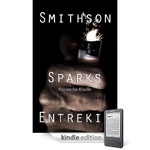 Well, one thing ebooks are doing is giving a lot of people some new ideas about marketing. Here’s a press release I just got from the new publisher Exciting Books:
Well, one thing ebooks are doing is giving a lot of people some new ideas about marketing. Here’s a press release I just got from the new publisher Exciting Books:
Sparks is the debut collection of short fiction from authors Will Entrekin and Simon Smithson,
available only through the Amazon Kindle platform, from 12/15/10 – 01/26/11. Sparks is a collection
of four pieces of short fiction, published by Exciting Books.The price point is US$0.99, and the end sales goal is 1,111,111 copies sold over the course of six
weeks. …The sales concept behind Sparks is founded on the belief that with the rapid advance of new
publishing paradigms, the audience for high-quality fiction is already present, and already waiting for
instant distribution. With millions around the world able to update content immediately via Kindle,
Sparks is a new kind of work for a new kind of readership.It’s also a new kind of challenge; the advent of e-publishing, and the establishment of a way to
instantly disseminate new text to millions of readers, has the potential to put the sales of authors
under the control of authors, and allow authors to reach worldwide audiences in way that would
have been impossible as short as a decade ago. …In our first day of sales, we hope to sell 1 copy.
In our first week, 10. In our second, 100. In our third 1,000, our fourth, 10,000 and our fifth, 100,000.
Until, in the last week of sales, our goal is to sell 1,000,000 copies.By integrating the reach of new media, the principles of social media (and social media marketing),
and the in-place sales platforms of Amazon, iTunes, and other eRetailers, Sparks can be presented to
an audience of millions – if nothing else, this is an opportunity to see if less-established authors can
use the new paradigm to match the sales numbers of best-selling writers and old-school publishing
houses.Whether it can be done or not remains to be seen. What’s fo
r sure is that the game has changed; it’s
a brave new world, and Gutenburg never saw this coming.
































Tried the sample pages. They were dull. I passed.
But it raised a question: Do publishers have any control over how much text is delivered when a shopper requests the sample? I was willing to give it a few more pages to impress me…
I haven’t even read the sample pages, but their public goal hasn’t intrigued me enough to try to figure out if their short fiction is even in a genre that I would enjoy reading. I’m not sure if the full press release would answer that question, but the quoted portion does not.
I don’t think that it’s even realistically achievable. For example, if there are 5 million distinct Kindle users out there (I assume that the average Kindle user has more than one device where they can read Kindle books), they need to get about 20% of the Kindle owners to buy their book. Most of the Kindle owners I know don’t go out of their way to find out about new books from established authors, let alone short stories from unknown authors (they may be famous authors, but I’ve never heard of them). If they heard about such a publicity stunt, they wouldn’t pay a buck to be a part of it, either.
Hello. Will Entrekin here. I’m one of the authors of Sparks. Thanks for the mention, Paul.
Brendan: no, we don’t have much control over sample pages. I think the working execution is that the sample is roughly ten percent of the overall book. Given that there are only four stories in Sparks, it’s an abbreviated sample.
Bruce: We’re thinking of the Kindle not as a device but as a platform, which is available on the iPhone, iPad, and iPod Touch (as of January 2010, estimates were that Apple had sold more than 40 million devices, and that’s before both iPad and iPhone 4); all Android devices (including the rooted nook color); Blackberry phones; PCs; Macs; and now the Web. Conservatively, the Kindle platform has potential to reach more than 100 million users quite easily, I’d think, when you factor in everyone in the world who has a smartphone or uses the Internet.
So far as the genre question goes, generally: I think the stories fall into mainstream, contemporary fiction, for the most part. Themes (family life, travel, artistic ambition, love, etc.) vary.